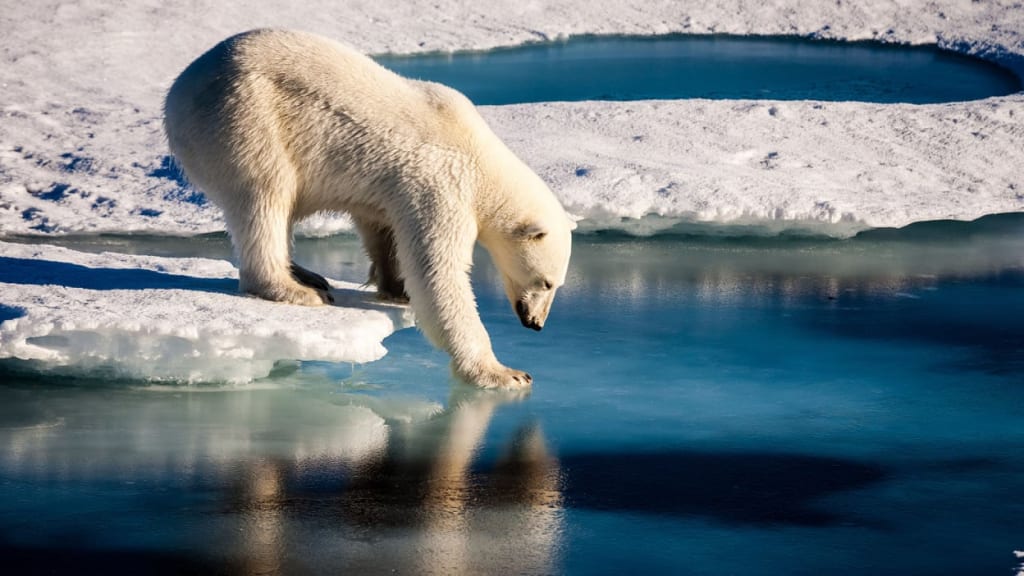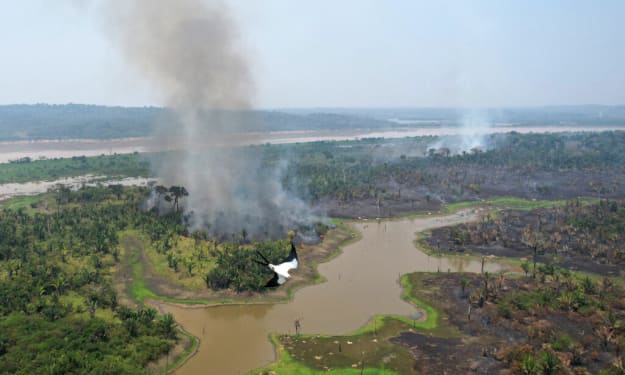Melting Ice and Rising Seas: How Climate Change is Transforming the Arctic
The Urgent Crisis of Our Time: Wildlife Suffering, Indigenous Displacement, and Rising Seas

The Arctic, Earth's natural refrigerator, is facing a crisis. Due to climate change, this vast frozen wilderness is warming up faster than any other place on our planet. This rapid warming is causing severe damage to Arctic ice, wildlife, and the indigenous people who call this place home. Let’s dive into how this region is changing, the destruction it's causing, and why it matters to all of us.
The Rapid Melting of Arctic Ice
The Arctic is heating up at twice the rate of the rest of the world. This intense warming is melting the ice at a shocking pace. Every summer, the ice cover shrinks to new lows, leaving more open water where thick ice once stood. This isn't just a local problem—it's a global one.
Arctic ice reflects sunlight, keeping our planet cool. Less ice means less reflection and more heat absorbed by the dark ocean waters. This speeds up the warming process, creating a vicious cycle where warming leads to more melting, and more melting leads to further warming.
Indigenous Communities in Peril
For thousands of years, indigenous communities like the Inuit have lived in harmony with the Arctic environment. They have developed unique cultures and skills perfectly suited to this harsh landscape. But with the ice disappearing, their way of life is under severe threat.
Hunting for seals on the ice, which is crucial for food and clothing, is becoming dangerous and difficult. Hunters now have to travel farther and face greater risks as the ice becomes less stable and more fragmented. Travel routes are changing, making it harder for communities to connect and access essential resources.
Permafrost, the frozen ground that stays solid year-round, is thawing. This causes homes to collapse and infrastructure to fail. Entire villages are sinking into the ground, and roads, pipelines, and buildings are being damaged beyond repair. People are being forced to leave their homes and their cultural heritage behind.
The Heartbreaking Loss of Wildlife
The Arctic's wildlife is suffering immensely. Polar bears, the iconic symbol of this region, are facing a bleak future. They rely on sea ice to hunt seals, their primary food source. With the ice melting earlier and forming later each year, polar bears have less time to hunt. They often have to swim long distances to find food, putting them at risk of drowning, and leading to malnutrition and population decline.
Walruses, who use sea ice as a resting platform between dives for food, are now forced to crowd onto land, leading to deadly stampedes and increased competition for resources. Seals, fish, and seabirds are also struggling as their habitats change and food sources become scarce.
The Arctic fox, a resilient and adaptable creature, is finding it harder to survive as its tundra habitat diminishes and competitors like the red fox move further north. Even the smallest creatures, like plankton, are affected. Plankton forms the base of the Arctic food web, and as their populations decline, the entire ecosystem is disrupted.
Rising Sea Levels: A Global Threat
The consequences of Arctic ice melt extend far beyond the region. One of the most significant impacts is the rise in global sea levels. When ice that sits on land, like glaciers and ice sheets, melts, it adds more water to the oceans. This contributes to rising sea levels, which can lead to coastal erosion, increased flooding, and the displacement of millions of people worldwide.
The Greenland Ice Sheet, for instance, is melting at an alarming rate. If it were to melt completely, it could raise global sea levels by about 7 meters (23 feet). While this would take centuries, even a small rise in sea levels can have devastating effects on low-lying countries and coastal cities.
Real-Life Devastation
Take the town of Kivalina in Alaska. This small indigenous village has been home to the Inupiat people for generations. However, due to rising sea levels and the melting permafrost, the town is literally sinking and eroding into the sea. The residents of Kivalina are facing the harsh reality of becoming some of the world's first climate refugees, needing to relocate to avoid being washed away.
Another example is the plight of the polar bears. With their hunting grounds shrinking, they are often forced to swim vast distances in search of food. This leads to exhaustion and, in some cases, drowning. Malnutrition is also a growing concern, as the reduced hunting season means less food is available. Starving polar bears are increasingly being found scavenging near human settlements, putting both humans and bears at risk.
A Call to Action
While humanity is distracted by conflicts and wars, the Arctic’s rapid destruction is a stark reminder of the urgent need to combat climate change. The fate of the Arctic hangs in the balance, but so too does the fate of our entire planet. We must act decisively and immediately to reduce our carbon emissions, protect natural habitats, and support the communities and wildlife that depend on them.
Governments and corporations must prioritize sustainable practices, and each of us can contribute by making more environmentally conscious choices in our daily lives. It's not just about saving the Arctic; it's about securing a livable future for all.
Small actions like reducing plastic use, conserving energy, and supporting renewable energy projects can make a difference. On a larger scale, advocating for strong environmental policies and supporting organizations working to combat climate change are crucial steps.
This crisis is real, urgent, and impacts us all. We have the power to make a difference—before it’s too late. The time to act is now.
About the Creator
Victor VinaHell
Hello! I'm Victor, an artist dedicated to sharing eco-information and some other random stuff! Through my articles, I aim to inspire and empower you to make changes that create a big impact on our planet. We can build a better world!
Enjoyed the story? Support the Creator.
Subscribe for free to receive all their stories in your feed. You could also pledge your support or give them a one-off tip, letting them know you appreciate their work.






Comments (2)
Another great article that more people could read! I lived in Alaska in the 80s and now have seen the glaciers recede. Polar bears drown because they have less icebergs to rest upon. It is so sad what humans are doing to our planet.
Wow it is brilliant. Thanks for sharing such an alert for us human beings.